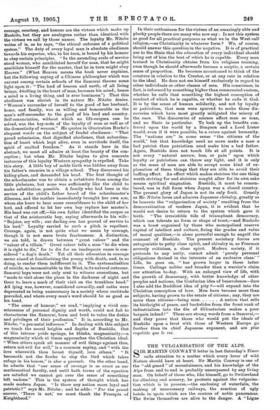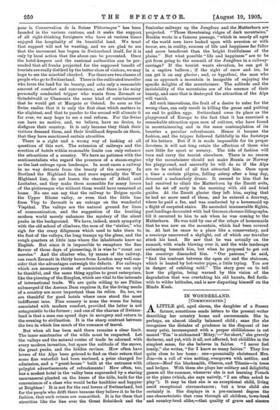S IR MARTIN CONWAY'S letter in last Saturday's Times calls attention
to a matter which every lover of wild Nature should have at heart. Sir Martin Conway is one of the "old guard" of mountaineers, and his knowledge of the Alps from end to end is probably unsurpassed by any living man. On behalf of those who, like himself, go to Switzerland for climbing and scenery, he protests against the vulgarisa- tion which is in process,—the enclosing of waterfalls, the making of unnecessary railways, the erection of ugly hotels in spots which are the centres of noble panoramas. The Swiss themselves are alive to the danger. A "Ligue
pour la. Conservation de la Suisse Pittoresque " has been founded in the various cantons, and it seeks the support of all right-thinking foreigners who have at various times enjoyed the hospitality of its beautiful land. We trust that support will not be wanting, and we are glad to see that the movement has begun in Switzerland itself, for it is only by local action that the abuse can be prevented. Once the hotel-keepers and the cantonal authorities can be per- suaded that all freaks projected for the supposed benefit of tourists are really disliked by the better class of visitors, we may hope to see the mischief checked. For there are two classes of people who go to Switzerland. There is the cultivated traveller who loves the land for its beauty, and asks only a reasonable amount of comfort and convenience ; and there is the noisy personally conducted tripper who wants from Zermatt or Grindelwaid or Chamonix the same kind of entertainment that he would get at Margate or Ostend. So soon as the Swiss realise that it is only the first class which matters in the slightest, and that to pander to the second will alienate it for ever, we may hope to see a real reform. For the Swiss can have no motive, and, we believe, have no desire, to disfigure their country. It is only because they think their visitors demand them, and their livelihood depends on them, that they have sanctioned certain atrocities.
There is a right and a wrong way of looking at all questions of this sort. The extension of railways and the erection of hotels within reasonable limits can only enhance the attractions of a country. We have no patience with the sentimentalists who regard the presence of a steam-engine as the last outrage upon landscape. In most cases a railway in no way detracts from the beauty of the scenery. In Scotland the Highland line, and more especially the West Highland line, do not lessen the charms of Atholl and Lochaber, and they make them accessible for many lovers of the picturesque who without them would have remained at home. No one can say that the railway to Brigue spoils the Upper Rhone valley, or even that the little line from Visp to Zermatt is an outrage on the wonderful Vispthal. The valleys are the natural ground for lines of communication, and the suggestion of the bustling modern world merely enhances the mystery of the silent peaks in the background. We have, indeed, much sympathy with the old school of climbers, the men of the "sixties," who sigh for the crazy diligences which used to take them to the foot of the valleys, the long tramps up the glens, and the rough quarters at little inns where the inhabitants knew no English. But since it is impossible to recapture the fine flavour of those days of pioneering, it is wise to "count our mercies." And the climber who, by means of the railway, can reach Zermatt in thirty hours from London may well con- sider that the advantages outweigh the defects. For railways which are necessary routes of communication we can only be thankful, and the same thing applies to great enterprises, like the piercing of the Simplon, which are vital to the interests of international trade. We are quite willing to see Philae submerged if the Assuan Dam requires it, for the living needs of a country are more important than its relics. So, too, we are thankful for good hotels where once stood the most indifferent inns. Fine scenery is none the worse for being associated with modern comfort, provided the latter is not antagonistic to the former ; and one of the charms of Switzer- land is that a man can spend days in savagery and return in the evening to civilisation. It is the sharp contrast between the two in which lies much of the romance of travel.
But when all has been said there remains a clear limit. The inner sanctuaries of the wilds must be respected. Let the valleys and the natural routes of trade be adorned with every modern invention, but spare the solitude of the snows, the great peaks, and the hidden ravines. How often have lovers of the Alps been grieved to find on their return that some fine waterfall had been enclosed, a price charged for admission, and a "guest-house" built at the entrance with polyglot advertisements of refreshments ! How often, too, has a modest hotel in the valley been superseded by a staring caravanserai planted on the knees of the hills, built for the convenience of a class who would be far healthier and happier at Brighton! It is not for the real lovers of Switzerland, but for the people who drift there because they believe it to be the fashion, that such crimes are committed. It is for them that atrocities like the line over the Great Scheideck and the funicular railways up the Jungfrau and the Matterhorn are projected. "Those threatening ridges of dark mountains," Ruskin wrote in a famous passage, "which in nearly all ages of the world men have looked upon with aversion or with terror, are, in reality, sources of life and happiness far fuller and more beneficent than the bright fruitfulness of the plains." But what possible "life and happiness" are to be got from going to the summit of the Jungfrau in a railway- carriage ? If the tourist wants elevation, he can get it in a captive balloon ; if the sight of snow and ice, he can get it on any glacier; and, ex hypothesi, the man who can so approach a mountain is incapable of enjoying the specific delights of the mountaineer. The solitude and the inviolability of the mountains are of the essence of their beauty, and once that is destroyed the attraction of the Alps will vanish.
All such innovations, the fruit of a desire to cater for the wrong class, can only result in killing the goose and putting an end to golden eggs. Switzerland owes its place as the playground of Europe to the fact that it has exercised a remarkable attraction upon men of culture, who have found in mountaineering and in the mere contemplation of its beauties a peculiar refreshment. Hence it became the fashion, and the tripper followed faithfully in the footsteps of his betters. But if it is made impossible for its proper devotees, it will not long retain the affection of those who care little for sport or scenery. The tide of fashion will turn and carry the tourist elsewhere. There is no reason why the mountaineer should not make Bosnia or Norway his playground, and assuredly be will do so if the Alps are to be robbed of all that attracted him. Once upon a time a certain pilgrim, falling asleep after a long day, dreamed a melancholy dream. It seemed to him that he had resolved to climb the Matterhorn by the Zmutt arete, and he set off early in the morning with old and tried guides. At the Zmutt glacier they left him, saying that he had no more need of them, and he entered a doorway, where he paid a fee, and was conducted by a housemaid up a flight of carpeted stairs. He ascended innumerable flights, past landings decorated with bad German chromo-lithographs, till it occurred to him to ask when he was coming to the Matterhorn. He was told by one of the relays of housemaids that he was now on the mountain, which had been covered in. At last he came to a place like a conservatory, and a concierge unscrewed a skylight, out of which our traveller stuck his head. He saw that he was actually on the summit, with winds blowing over it, and the wide landscape swimming beneath him, but when he proposed to get out the concierge dissuaded him. "Our patrons," he said, "find the contrast between the open air and the staircase, which is heated by hot-water pipes, a little trying. You are in danger of catching cold." The story goes on to tell how the pilgrim, being warned by this .vision of the degradation that was overtaking his old haunts, fled forth- with to wilder latitudes, and is now disporting himself on the Hindu Kush.



































 Previous page
Previous page